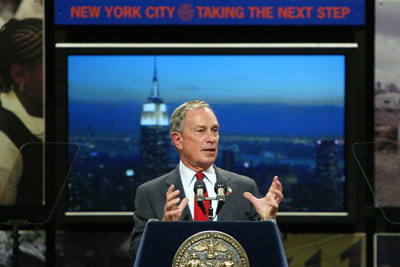
Mayor Michael Bloomberg said he would do lots of things in his State of the City address last week.
There were the little things, promises to:
• retool 911 so it can accept photos of crime scenes from cell phones;
• increase funding for a program that sends nurses to consult first time mothers;
• expand the Civilian Complaint Review Board;
• fill out forms for low-income New Yorkers so they can claim federal tax credits;
• lead a pack of gun weary American mayors as they descend on Washington to demand changes in federal law.
And then there were the big things:
• a $1 billion tax relief plan focused primarily on property tax cuts;
• further changes to the structure of the education system.
Public officials march out such promises every January in their State of the (nation, state, city, or borough) speeches. Governor Eliot Spitzer gave his State of the State address earlier this month; President George Bush will give his State of the Union on Tuesday; and Council Speaker Christine Quinn will give her own State of the City soon.
Mayor Bloomberg started his speech this year by apologizing for one promise he didn't follow through on – there was no Subway Series in 2006. But many of the other things he mentioned last year were either breezed over or not mentioned at all. The city did not pick an architect to design a plan for Governors Island or a developer to revamp Willets Point, and didn't break ground on Atlantic Yards. Despite Bloomberg's promise, the Reptile Wing of the Staten Island Zoo has still not reopened.
Other areas that Bloomberg has made a big deal about got scant mention. Arguably the biggest initiative to come out of last year's speech was the city's anti-poverty efforts, yet the mayor barely touched on the year-long campaign that followed. Nor did he spend more than a few words on his plan to create long-term sustainability policies.
This week we take a look at the two areas the mayor did focus on:
TAX CUTS: The mayor says his property tax relief plan will benefit individual New Yorkers and spark the economy, but economists say it will hardly be noticed.
EDUCATION: After four years, Bloomberg is reorganizing the schools again, but do the changes address the problems that still persist in the city’s public schools? Â




